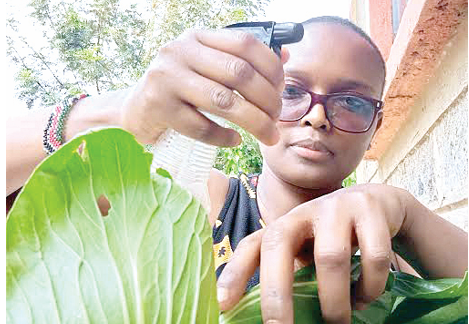Kitchen gardens saving families during tough economic times

In an economy where the price of every commodity seems to be skyrocketing; from fuel to gas to cooking oil, low and middle-income families are feeling the pinch of having to dip further into their pockets to put food on their tables.
Aisha Imelda, a 25-year-old mother of two laments over the price of the five-litre cooking oil that’s now trending at roughly between Sh1,400 and Sh1,700 up from Sh1,050 in late 2020.
A resident of Malindi, Kilifi County, for over two years now, she deplores the high prices of vegetables in the region, with a tomato going for Sh10, an onion retailing at the same price and a few spinach stalks priced at Sh25.
“These days, it costs more than Sh200 every day to prepare a simple evening meal to feed my family, while a few years ago, we would comfortably have dinner on a budget of Sh100 or slightly above,” Imelda recalls.
The high cost of food has forced Imelda to cultivate a few crops on her own to lessen her burden. Her kitchen garden consists of some traditional vegetables and lemongrass commonly used to flavour tea. Lucky enough for her, water is in abundant supply in Malindi. Her long-term goal is to cultivate other vegetables, including onions, tomatoes and potatoes.
Urban kitchen gardening is the art of growing vegetables in a town setting, usually done in containers, such as buckets, raised boxes or window boxes.
Grace Obara, a member of the Urban Kitchen Gardeners Group grows her crops in small spaces. She cultivates in vertical sacks on a garden space of a 50 by 100 plot along Kangundo Road, citing that vertical farming increases the amount of produce per square foot.
Stress-relieving benefit
While observed as a means of food security, urban kitchen gardening can have other interests, such as relieving stress from life-related problems, and Christine Gatwiri, an urban farmer and the founder of Balcony Mboga Farm certainly attests to that.
She says that her kitchen gardening journey started in 2020, just after the coronavirus pandemic struck the country while suffering from depression.
“I was forced to work remotely due to the countrywide dawn to dusk lockdowns, A few months later, I decided to quit my job and moved out of my apartment and city to pursue kitchen gardening,” she recounts.
“Working on the soil, watching plants grow and caring for them helped me heal. I was saving money too, to purchase small farm containers and sacks,” she remarks.
Tackling water cost
Water is a significant factor in kitchen gardening. Most people use piped water, which can be expensive if metred. Obara’s solution was to harvest rainwater, where she dug a small hole and applied a dam liner.
Gatwiri recommends using kitchen water, especially if one stays where water is in short supply. “Most vegetables don’t require much water, and you can irritate them every evening when the scorching sun has died down,” she advises.
Access to soil and manure are other challenges. Obara obtains manure from her neighbours, who keep rabbits and chickens. She barters the manure for vegetables that are left unsold due to quality or cosmetic shortcomings. The leftover vegetables are used as feed for the neighbours’ rabbits and chickens.
Small-scale farming restricts the use of conventional pesticides and insecticides due to economic reasons. Hence, there is a preference for natural methods, such as intercropping with rosemary to ward off pests. Some online-farming groups share home-based solutions like spraying vinegar solution on the crops to tackle pests.
“Social media communities come in handy in knowledge exchange among kitchen gardeners. I learned how to apply eggshells and banana peels for calcium and potassium respectively, from interacting with other small-scale kitchen gardeners on an online platform. People in these groups farm to relieve stress, save money, and earn some income from selling their extra produce,” she reveals.
She aims to equip urban residents with the tools and knowledge needed to grow food vertically and in small spaces.
With biweekly harvests, Obara has enough vegetables for her family. During school holidays, she saves up to Sh150 a day from buying vegetables for lunches and dinners. In addition, she earns some income from selling any excess to her neighbours.
She sells the vegetables at a wholesale price of Sh50 to local grocery businesses people.
Hyper localisation of food supply, Obara says, could be key in making kitchen gardening even more impactful. “Cities are increasingly expanding into surrounding arable land, which consequently means that urban food supplies must come from further and further away,” she offers.
“Furthermore, the Covid-19 pandemic has taught us that supply chains can be disrupted easily. Using income as an incentive, more people can grow food for themselves and their immediate neighbourhoods. This way, we have a shot at nutritional diversity and urban food security,” she says.







